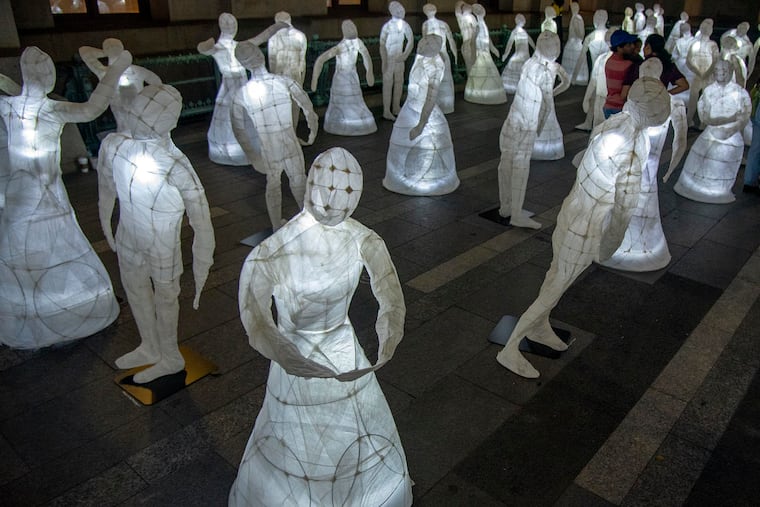World Mental Health Day: What Americans think about 988 hotline, suicide prevention, police response to crisis
Two recent polls reveal a nation in which people are struggling.

This story contains references to suicide. If you or someone you know is thinking of suicide, call or text 988.
Nine in ten adults in the United States believe the country is experiencing an epidemic of mental health crises, according to a recent Kaiser Family Foundation/CNN survey. And nearly 3 in 5 people know someone who thought about suicide, a new Harris poll has found.
Together, these polls reveal a nation in which people are struggling, and many think existing services are insufficient.
A majority of people are worried about anxiety, depression, and severe mental illness in adults and the mental health struggles of children and teenagers, the national CNN/KFF survey of 2,004 people found.
» READ MORE: Dilworth Park fills with life-size lanterns to raise awareness for suicide and mental illness
The Harris survey, commissioned by Suicide Prevention Resource Center and the American Foundation for Suicide Prevention, found that the percentage of people who reported experiencing any mental health condition has increased from 57% in 2018 to 67% in 2022.
New hotline aims to help
In July, a new three-digit national mental health hotline launched. Proponents billed 988 as the 911 for mental health. As of this summer, however, about half of Americans had never heard of 988, according to both of the recent surveys.
This is an improvement, however, from before its launch. Last fall and spring, polls by the Alliance for Mental Illness and Ipsos found that fewer than 1 in 4 people had heard of plans for the new line.
In addition to being a shorter, more memorable number than its predecessor — the 10-digit National Suicide Prevention Lifeline number — 988 aims to avert a police response to mental health crises.
About 30% of the calls placed to 911 for emergency help would be more appropriately directed to 988, Kristen Houser, deputy secretary of Pennsylvania’s Office of Mental Health and Substance Abuse Services, told The Inquirer last year.
Many Americans are nervous about having police officers respond to a mental health crisis. The KFF/CNN poll found that a quarter of respondents believed that calling 911 when they or a loved one is in crisis would make the situation worse.
The most common reasons that respondents cited for their concern were that police are untrained to deal with mental health and that it could be unsafe for people in mental health crisis. Others said police weren’t the right resource, that they don’t trust police, and that they fear police would lead to an arrest or forced hospitalization.
» READ MORE: When mental health crises require more than a phone conversation, these mobile units come to help
The fear that police will respond to a mental health crisis also came up in the recent Harris poll on suicide.
Two-thirds of the 2,054 people across the country surveyed in July cited at least one barrier to reaching out for crisis services. About one in four noted fears about out-of-pocket costs, what their family might think, and that police would respond. Similar numbers also didn’t have confidence in their area’s services to help.
Finding help when it’s needed
In Philadelphia, a small number of 988 calls get transferred to police — 29 out of over 6,000 calls in July. In about 12% of calls, a mobile crisis unit staffed with behavioral health specialists is dispatched.
Mental health has long been associated with shame and reaching for help with weakness. These attitudes are changing, the Harris poll showed.
More than half of adults view those who speak openly about their mental health as brave and view seeing a mental health professional as a sign of strength. Nearly all people who responded to the survey believed that there are ways to reduce suicides — and more than 8 out of 10 would want to learn how they can be part of that effort.
How to find help
- The 988 Suicide & Crisis Lifeline offers help in over 150 languages. Call or text 988. En Español, marca al 1-888-628-9454. If you're deaf or hard of hearing, call 1-800-799-4889.
- The Philadelphia Suicide and Crisis Center offers guidance and assessment about depression, self harm, hopelessness, anger, addiction, and relationship problems, at 215-686-4420.
- Veterans Crisis Chat is available at 1-800-273-8255 or by text at 838255.
- The Trevor Project offers crisis support to LGBTQ+ youth 25 and under. Call 1-866-488-7386, text START to 678678, or start a chat.